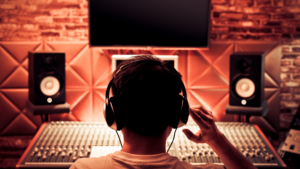Students often ask me how they can learn music production. I always recommend a combination of formal classes with self-teaching, tutorials and experimentation. The path of learning music production is very fulfilling and the learning process never ends. So you can you teach yourself music production?
Here are some steps to help you get started:
- Set Clear Goals: Determine what aspects of music production you want to focus on. It could be learning a specific genre, mastering a particular software or instrument, or understanding the technical aspects of mixing and mastering.
- Acquire the Necessary Equipment: Invest in the essential equipment you’ll need for music production. This may include a computer, digital audio workstation (DAW) software, MIDI keyboard, audio interface, studio monitors or headphones, and microphones.
- Learn the Basics of Music Theory: Familiarize yourself with the fundamentals of music theory. This knowledge will help you create melodies, chord progressions, and arrangements that sound harmonically pleasing. You can find online resources, books, or even enroll in a music theory course.
- Study and Experiment with a DAW: Choose a DAW that suits your needs and learn its ins and outs. Some popular options include Ableton Live, Logic Pro, FL Studio, and Pro Tools. Start by exploring its basic features, such as recording, sequencing, editing, and mixing.
- Learn from Online Tutorials and Courses: There are countless online resources available to help you learn music production. Websites like YouTube, Udemy, Coursera, and Skillshare offer tutorials and courses taught by experienced producers. Focus on topics that interest you and gradually expand your knowledge.
- Practice Regularly: Consistent practice is key to improving your music production skills. Dedicate regular time to experiment, create new tracks, and explore different techniques. Embrace the learning process and be patient with yourself as it takes time to develop proficiency.
- Analyze Music You Love: Listen attentively to the music you enjoy and analyze its structure, arrangement, sound design, and mixing techniques. Try to recreate elements from your favorite tracks to gain a deeper understanding of how they were produced.
- Collaborate and Seek Feedback: Connect with other musicians and producers to collaborate on projects or exchange feedback. Participate in online forums, communities, and local meetups to expand your network and learn from others. Feedback can be invaluable in identifying areas for improvement.
- Stay Up-to-Date: The field of music production is constantly evolving, so stay updated with new trends, techniques, and technologies. Follow industry blogs, subscribe to music production channels, and attend workshops or conferences when possible.
- Be Creative and Enjoy the Process: Music production is a creative outlet, so don’t be afraid to experiment, take risks, and develop your unique style. Enjoy the process and let your passion for music guide you as you continue to learn and grow.
I am certified in Avid ProTools and have professional certification with Ableton Live. ProTools is still industry standard in recording studios and Ableton Live is what I use for my personal recording projects. I highly recommend becoming in fluid in one or both of those software platforms.
Remember, learning music production is a journey that requires patience, persistence, and dedication. Embrace the learning process, stay motivated, and have fun along the way. Good luck!
